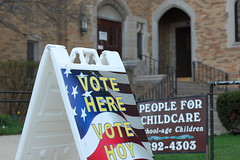 The Moving to Opportunity (MTO) experiment is well-known in social science circles and has provided evidence that relocating residents of poor neighborhoods to more advantaged neighborhoods can have positive outcomes, especially on physical and mental health for some groups. But new evidence cited in The Atlantic this month shows that such interventions may have and unintended dark side for political participation.
The Moving to Opportunity (MTO) experiment is well-known in social science circles and has provided evidence that relocating residents of poor neighborhoods to more advantaged neighborhoods can have positive outcomes, especially on physical and mental health for some groups. But new evidence cited in The Atlantic this month shows that such interventions may have and unintended dark side for political participation.
MTO’s designers in the mid-1990s hoped to improve conditions of employment, education, and health of low-income families in neighborhoods with poverty rates of 40 percent or higher. The experiment included about 4,200 families in five major U.S. cities.
The chance for residential mobility was determined by lottery. Some families remained in their current public housing development. A second group received standard Section 8 housing vouchers. A third set received vouchers that could only be used toward an apartment in a low-poverty neighborhood — areas with a poverty rate below 10 percent. (Families that received vouchers weren’t obligated to use them.)
Despite good intentions, not all of the results of this mobility have been positive. Some researchers have found that moving did not improve residents’ economic well-being and arrest rates for young men actually increased. It seems that Claudine Gay, political scientist at Harvard, has pinpointed another less-than-ideal outcome: decreased political participation.
Gay examined voter registration and turnout data in the 2002 primary and the 2004 presidential election. She compared the political participation of all three Moving to Opportunity groups: those who “lost” the lottery and stayed put, those who moved with Section 8 vouchers, and those who moved into low-poverty areas (as well as those who received vouchers but chose not to move).
Her analysis turned up no negative effects with regard to voter registration, and turnout for the 2002 primary was uniformly low. But Gay did observe a much lower voter turnout in the 2004 presidential election among families that received a voucher. The effects were especially pronounced for the so-called lottery “winners”: adults that moved into low-poverty neighborhoods had a lower voter turnout by 19 percent, compared with those who “lost” the lottery…
While hang-ups in the logistics of moving, like registering to vote in a new neighborhood or not knowing your new polling place, might seem like likely culprits in the decrease, Gay offers a different explanation:
Instead, Gay reasons, the primary source of decreased voter turnout is likely the “social disruption” that occurs when a poor urban family relocates to a higher-income area. Community connections are strongly linked with political participation, and while it takes time for a new resident of any community to connect socially, that difficulty may be greater for residents whose socioeconomic profile doesn’t match that of their new neighbors.
Given the high stake that poor citizens have in many public policy decisions, Gay argues that the effects of residential mobility on political participation must not be ignored.

Comments